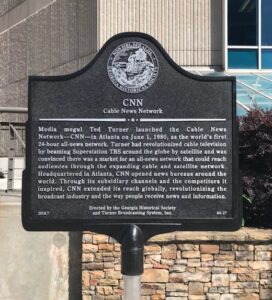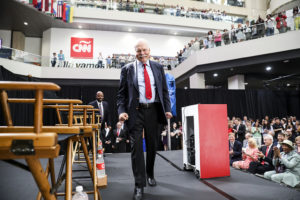 To better explore this year’s Georgia History Festival theme, “Tear Down This Wall: Georgia in Cold War America,” this week’s #MarkerMonday examines the CNN: Cable News Network historical marker located outside of the CNN Center in Atlanta. On June 1, 1980, Ted Turner launched CNN as the first 24-hour all-news network. Turner pushed to provide inclusive around-the-clock worldwide news, despite the industry’s belief that it could not be done. At the time, the major news networks, ABC, NBC, and CBS, aired nightly broadcasts covering the day’s news.
To better explore this year’s Georgia History Festival theme, “Tear Down This Wall: Georgia in Cold War America,” this week’s #MarkerMonday examines the CNN: Cable News Network historical marker located outside of the CNN Center in Atlanta. On June 1, 1980, Ted Turner launched CNN as the first 24-hour all-news network. Turner pushed to provide inclusive around-the-clock worldwide news, despite the industry’s belief that it could not be done. At the time, the major news networks, ABC, NBC, and CBS, aired nightly broadcasts covering the day’s news.
At first, CNN was not seen as a legitimate network. People referred to it as the “Chicken Noodle Network,” and CNN reporters were even barred from attending press events at the White House because the station was not as noteworthy as others at the time. However, in 1982, the Georgia Supreme Court ruled that CNN reporters could not be excluded under the First Amendment. CNN quickly established itself as a notable news network, and only a few years after its creation, CNN’s Bernard Shaw served as a moderator for a Presidential debate between George H. W. Bush and Michael Dukakis in October 1988. CNN is also remembered as the only station to cover the Challenger space shuttle’s launch and explosion in 1986 on live television.
Turner’s international ambitions were inspired after a meeting with Fidel Castro in 1982. Despite their political differences, Turner believed that people do not have to agree with others to learn more about their beliefs, and that conversations and understanding can reduce potential threats. By organizing new bureaus around the world, CNN’s reporters were readily available to provide viewers with instant coverage of domestic and international news. Reporting from different locations and perspectives gave nations, leaders, and people the ability to have conversations with each other across the world. CNN notably covered both sides in areas of conflict, including the Lebanese Civil War in the early 1980s and live coverage of the Persian Gulf War in 1991. CNN reporters were in Iraq to interview Saddam Hussain for a second time when Operation Desert Storm began. Placing viewers on the frontlines drove more people to CNN and helped establish its place as the international station seen today.
Explore the links below to learn more:
Business History Initiative – CNN – Cable News Network
Today in Georgia History – CNN Debut
Today in Georgia History – Ted Turner
Encyclopedia Britannica – CNN
History.com – This Day in History: June 1, 1980
Defining moments from 40 years of CNN
Amanpour on CNN - Ted Turner recalls meeting with Fidel Castro

